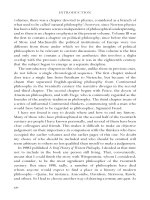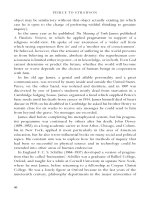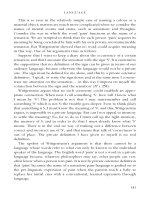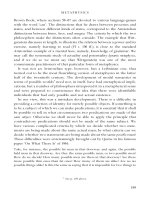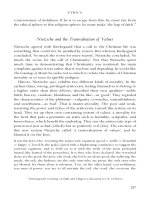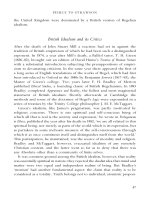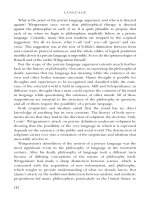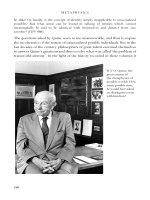Philosophy in the modern world a new history of western philosophy, volume 4 (new history of western philosophy) ( PDFDrive ) (1) 15
Bạn đang xem bản rút gọn của tài liệu. Xem và tải ngay bản đầy đủ của tài liệu tại đây (17.67 KB, 1 trang )
INTRODUCTION
volumes, there was a chapter devoted to physics, considered as a branch of
what used to be called ‘natural philosophy’; however, since Newton physics
has been a fully mature science independent of philosophical underpinning,
and so there is no chapter on physics in the present volume. Volume III was
the first to contain a chapter on political philosophy, since before the time
of More and Machiavelli the political institutions of Europe were too
different from those under which we live for the insights of political
philosophers to be relevant to current discussions. This volume is the first
and only one to contain a chapter on aesthetics: this involves a slight
overlap with the previous volume, since it was in the eighteenth century
that the subject began to emerge as a separate discipline.
The introductory chapters in this volume, unlike those in previous ones,
do not follow a single chronological sequence. The first chapter indeed
does trace a single line from Bentham to Nietzsche, but because of the
chasm that separated English-speaking philosophy from Continental
philosophy in the twentieth century the narrative diverges in the second
and third chapter. The second chapter begins with Peirce, the doyen of
American philosophers, and with Frege, who is commonly regarded as the
founder of the analytic tradition in philosophy. The third chapter treats of
a series of influential Continental thinkers, commencing with a man who
would have hated to be regarded as philosopher, Sigmund Freud.
I have not found it easy to decide where and how to end my history.
Many of those who have philosophized in the second half of the twentieth
century are people I have known personally, and several of them have been
close colleagues and friends. This makes it difficult to make an objective
judgement on their importance in comparison with the thinkers who have
occupied the earlier volumes and the earlier pages of this one. No doubt
my choice of who should be included and who should be omitted will
seem arbitrary to others no less qualified than myself to make a judgement.
In 1998 I published A Brief History of Western Philosophy. I decided at that time
not to include in the book any person still living. That, conveniently,
meant that I could finish the story with Wittgenstein, whom I considered,
and consider, to be the most significant philosopher of the twentieth
century. But since 1998, sadly, a number of philosophers have died
whom anyone would expect to find a place in a history of modern
philosophy—Quine, for instance, Anscombe, Davidson, Strawson, Rawls,
and others. So I had to choose another way of drawing a terminus ante quem. As
xiv
